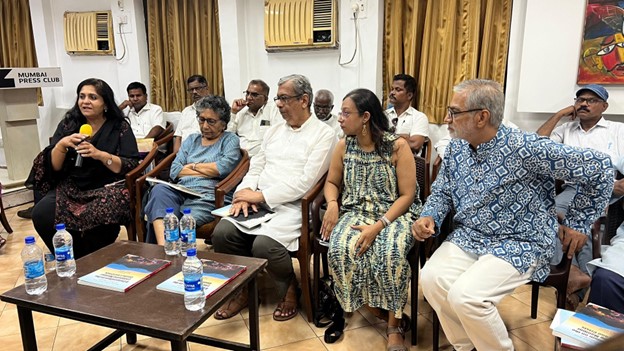In a poignant gathering in Mumbai, activists and organizations united to shed light on the harrowing violence ravaging the state of Manipur, culminating in the release of a meticulously compiled book of fact-checked reports. This endeavor, aimed at fostering awareness and dialogue, brought together voices from diverse backgrounds to examine the intricate tapestry of Indian polity through the lens of Manipur.
On a recent Thursday, the Bombay Catholic Sabha (BCS), the Centre for Study of Society and Secularism (CSSS), and Citizens for Justice and Peace (CJP) orchestrated the unveiling of the book titled 'A Compendium on the Continuing Manipur Conflict and Crisis'. The compendium, a collaborative effort, serves as a repository of meticulously documented reports chronicling the ethnic strife engulfing Manipur. Compiled by activist and educationist Dr. Syeda Hameed and advocate Clifton D' Rozario, it delves into the heart of the conflict, drawing from firsthand interviews and exhaustive research.
The CSSS dispatched four dedicated teams to Manipur in the wake of the violence that erupted last year. These teams meticulously documented the causes, consequences, and nuances of the conflict, offering insights into the plight of women, the underlying tensions fueling ethnic clashes, and the dire circumstances faced by victims across all communities in Manipur. Moreover, the compendium undertakes the crucial task of fact-checking, dispelling misinformation that proliferated amidst internet restrictions imposed in the state.
Neha Dabhade, Executive Director of CSSS, reflected on the enduring impact of the compendium, stating, "It serves as a poignant reminder of our interactions with the people of Manipur, revealing a stark reality unchanged nearly a year later. The internet blackout inflicted more harm than good, shrouding Manipur in a veil of silence. Manipur, in many ways, stands as a litmus test for the trajectory of India."
The book launch, hosted at the Mumbai Press Club, provided a platform for Teesta Setalvad, Secretary of CJP, to underscore the staggering toll exacted by the violence plaguing Manipur. "Over the past year, the violence has claimed 170 lives, laid waste to over 200 villages, destroyed 7,000 homes, razed more than 360 churches, and displaced 41,425 individuals. This upheaval bears eerie semblance to past tragedies like the Gujarat riots, albeit with a different arsenal. It raises serious questions about the role of the state in perpetuating the conflict," she lamented.
Father Frazer Mascarenhas, a stalwart activist and former principal of St. Xavier's College, echoed sentiments of concern and urgency. "There is a palpable suspicion that the violence has been orchestrated, if not endorsed, by state actors. Manipur is a cauldron of unchecked violence and impunity, poised to spill over into a larger national crisis. The upcoming elections represent a pivotal moment for intervention against this tide of violence," he emphasized.
Amidst the somber reflections and impassioned pleas for action, the release of the fact-checked reports symbolized a collective commitment to truth, justice, and the pursuit of peace in the embattled region of Manipur. As the book finds its way into the hands of policymakers, activists, and concerned citizens alike, it serves as both a call to action and a beacon of hope in the face of adversity.






